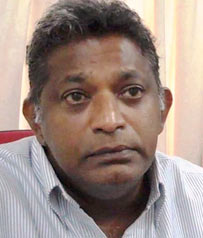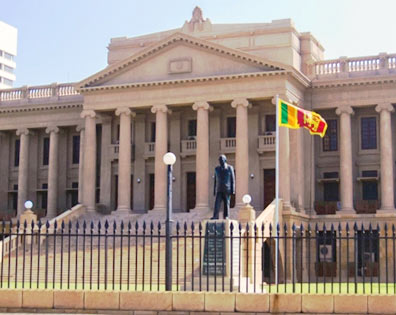The challenge to make more history
by Dr. Paikiasothy Saravanamuttu
 Maithripala Sirisena hit the world's headlines at the beginning of
2015 as the political midget who defeated the political giant Mahinda
Rajapaksa to win the presidency of Sri Lanka. At the end of 2015 too, he
hit international and national headlines with his remarks about the
lingerie-throwing incident at the Enrique Iglesias concert in Colombo
and his references to cultural values and medieval punishments. From the
sublime to the ridiculous; is this a metaphor for his year-old
presidency? Maithripala Sirisena hit the world's headlines at the beginning of
2015 as the political midget who defeated the political giant Mahinda
Rajapaksa to win the presidency of Sri Lanka. At the end of 2015 too, he
hit international and national headlines with his remarks about the
lingerie-throwing incident at the Enrique Iglesias concert in Colombo
and his references to cultural values and medieval punishments. From the
sublime to the ridiculous; is this a metaphor for his year-old
presidency?
In the main, I think not, at the same time as I hope that in future
he will be more communication and media savvy before he makes an issue
out of what would have remained a non-issue until he mouthed off. The
social media world from which he drew decisive support in January 2015
has used the occasion to highlight the shortcomings of his presidency
and to question his priorities with not inconsiderable derision and
scorn.
I mention this because of its political significance. This is a group
that is influential in setting the agenda of public chatter far beyond
those who access the net. It is a group too that is the most
disenchanted with the pace of progress on financial corruption and most
susceptible to the argument about all politicians being the same and
prone to deals.
 It is not that they have turned to the Rajapaksas in acute
desperation, but rather that they could stay at home and eventually lend
support to someone more righteous than rights friendly, someone more
fascist than freedom loving. I mention all of this because in
considering the pros and cons of the first year of the Sirisena
presidency, one must place the assessment in the context of the
challenges besetting the country. It is not that they have turned to the Rajapaksas in acute
desperation, but rather that they could stay at home and eventually lend
support to someone more righteous than rights friendly, someone more
fascist than freedom loving. I mention all of this because in
considering the pros and cons of the first year of the Sirisena
presidency, one must place the assessment in the context of the
challenges besetting the country.
Restoration
What happened in 2015 was a restoration of faith across the country
in its future as a functioning democracy. What had happened before that
was State capture with majoritarian populism, nepotism and whole scale
loot and plunder ruling the roost under the war hero patriarch, his over
zealous siblings, offspring and other assorted relations, apparatchiks
and hangers-on.
Rajapaksa claimed to be defending sovereignty as state capture and
ransacking continued apace; now Sirisena claims to defend cultural
values amidst allegations of the return of nepotism, corruption and
impunity. President Sirisena's biggest challenge in 2016 is to stem the
perception of the attrition of the moral high ground he occupies, not on
cultural values and the excitement of the moment, but on the core,
values of governance enduring in time - transparency and accountability.
Maithripala Sirisena is the first holder of the office of the
executive presidency who has presided over a diminution of those powers
as in the case of the 19th amendment. The latter did not go far enough
and the manner in which it was done left a lot to be desired from the
perspective of governance, but the point is that it did happen and he
saw it through. His predecessors had promised but never delivered.
Admittedly there was some debate as to whether the central promise of
the joint opposition's presidential election campaign had been 'change'
or 'abolition' in respect of the executive presidency. Notwithstanding
this, the powers have been clipped and now the promise is 'abolition'.
Accountability
In this respect, I do believe that the majority of my fellow
citizens, one year later, continue to have faith in the president's
sincerity on this score and his commitment to fulfill the promises of
his election campaign. The public perception of President Sirisena's
sincerity and, indeed, that of his government - abolition of the
executive presidency aside - depends on what is delivered as far as
accountability is concerned.
It is worth reminding that in the presidential election campaign,
despite the attempts of the then regime to arouse communal passions, the
national question, namely the political and constitutional settlement of
the ethnic conflict, took a relative back seat.
The rationale was that before anything else could be done, the
Rajapaksa's had to be defeated - and of course the unity of so broad a
coalition could not be risked.
The argument was that the defeat of the Rajapaksas would pave the way
and create an enabling environment in which key issues could be
addressed. Consequently, accountability was invested with considerable
salience in an election in which, notwithstanding our multiple
identities - especially in religious and ethnic terms - we were treated
as citizens and not merely as voters.
Accountability, however, meant different things to different
constituencies: in the north and east, accountability for human rights
abuses and, in the rest of the country, for corruption.
Throughout the Sirisena presidency, we have been fed a daily diet of
allegations about the loot and plunder of the State by the previous
regime. Yet as not just the cynics, but the disappointed too, point out:
statements are given, arrests are made, most go to hospital or get bail.
Are there no low hanging fruit in this respect? Is there a strategy for
this that takes into account the need for due process, the marshalling
of evidence that will stand up in a court of law and the constraint of
limited resources?
Perception
A public perception that there is a fudge, a 'deal' on this score, is
extremely damaging for electoral democracy in this country. On
Maithripala Sirisena's shoulders, primarily, rests the responsibility of
demonstrating that all politicians in this country are not alike; that
there are some who are willing and able to clean the Augean stables of
corrupted government and deliver on governance. Or else, as pointed out
above, the country could turn to authoritarianism once more.
Accountability in respect of human rights violations, crimes against
humanity and war crimes is as or more challenging. The Sirisena
government has co-sponsored the resolution in the UN Human Rights
Council. It has pledged to establish a number of mechanisms for
transitional justice including a special counsel's office and court
which, could have international judges and lawyers proactively engaged
in the process.
The pledge is located within the legal confines of the law of the
land. A lot is riding on this - reconciliation and national unity, in
particular.
The President, as minister of defence and, as the head of the
security establishment, has to bring the military on board in respect of
this and meet, head on, the argument that transitional justice and the
mechanisms to ensure it are not part of an internationally ordained
conspiracy to turn war heroes into war criminals. The argument must be
made, and forcefully, that this process is one that this country needs
in order to heal and prosper and, that the starting point of the process
is not some ridiculous blanket assumption that the entirety of the
security establishment is staffed with war criminals.
Whilst the President has taken a high profile role in the release of
lands in the north and east, he needs too to ensure that the security
establishment on the ground understands that there cannot be resort to
standard operating procedures of yore, which undermine the claim that
reconciliation and national unity are priorities of his government. He
needs to make sure that rights violations cease and that the security
establishment too become stakeholders in the reconciliation and
governance enterprise.
Same page
Central to this is that he and his prime minister are on the same
page, sing from the same hymn sheet and not contradict each other or
allow for room for the perception that there are differences between
them on the key issues of public policy.
There have been a number of media reports throughout the past year,
suggesting that there are differences and that each one, in his own way,
is going his own way. These reports may well be exaggerated, but in this
decisive year for governance and reconciliation, it is important that no
space is given to lend credence to them and that the political
interdependence that binds the two in this historic partnership is
clearly and cogently demonstrated to the country at large. In this
partnership, the obvious relative merits need to be emphasized and
marshalled to full effect in the service of the joint enterprise.
SLFP
Underpinning all of this of course are the political dynamics of an
electoral democracy and the unique, if unenviable position the president
finds himself in with regard to his own party, the Sri Lanka Freedom
Party (SLFP). The issue here is as to whether he is secure in the
knowledge that his party is behind him in full or substantial measure.
This, of course, rests on the belief that he can secure its political
fortunes into the future at the same time as he presides over a
diminution of the powers of his elected office. Maithripala Sirisena's
success in this respect is his ability to maintain his ranking as the
most respected politician in the country and therefore the indispensable
electoral asset of his party. He has though, at the same time as a party
leader, to be as bold as he may seem to be deft in handling challenges
to his power and authority. This means a new SLFP at the helm of a new
political culture and paradigm.
So far, he has held it together. The big challenges of 2016 however,
loom. He has held it together amidst not inconsiderable criticism, as
evinced at the time of the general election and the nomination of his
predecessor as a candidate.
Some argued then that he was caving in; others that this was a shrewd
and canny move to keep the party together and the Rajapaksas in check.
Into 2016, wit and wisdom will have to be continuously employed to
demonstrate to his party that he is indeed their undisputed leader - the
fate of the country cannot be mortgaged to a continuing battle over the
heart and soul of the SLFP.
The President has his work cut out for him: to keep the faith and to
keep the faithful.
|

